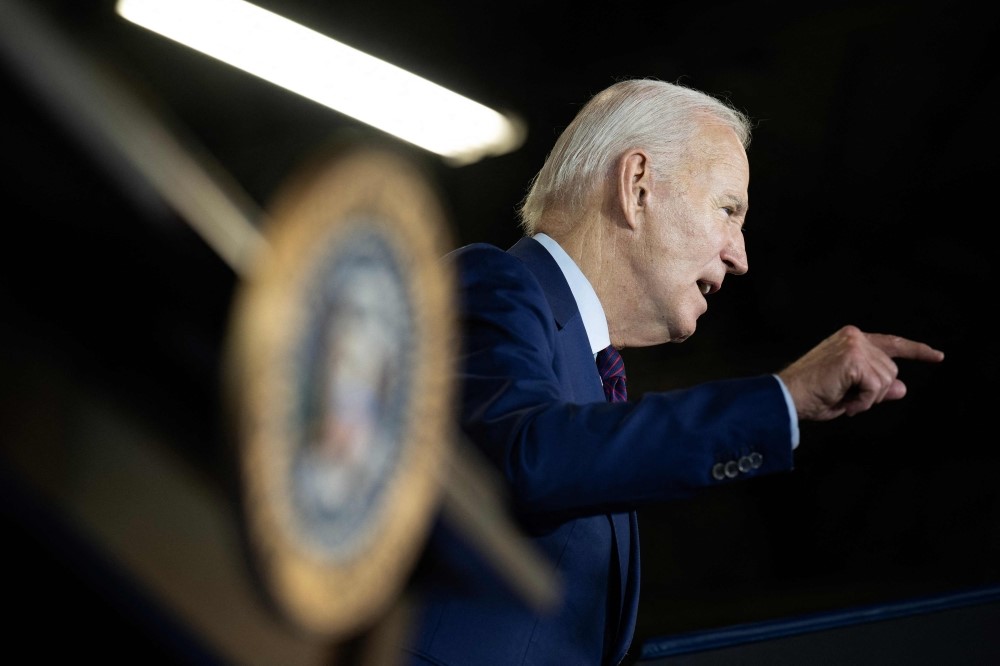What exactly does “Bidenomics” entail? Well, it seems to be a system where everyone is expected to pay their fair share of taxes, unless, of course, your name happens to be Hunter Biden, the son of President Biden. Interestingly, Hunter Biden failed to meet the legal deadline for paying his $125,000 tax debt, yet the US Department of Justice decided not to pursue any action against him. This revelation has caught the attention of commentators like Miranda Devine, who aptly titled her article as “The True Exclusive News of Bidenomics: Corruption, Tax Evasion, and Hunter” in the New York Post.
On July 28, 2023, President Biden addressed the concept of “Bidenomics” during his visit to the Auburn Manufacturing Company in Auburn, Maine. It’s worth noting that in the previous election, Biden had a significant lead of over 10% against Trump in Maine, which is traditionally known as a Republican stronghold. However, since Biden assumed office, the Maine economy faced a significant setback, leading to a notable decline in Biden’s support ratings, with Trump’s popularity surpassing his. As Maine is a crucial manufacturing hub in the United States, Biden’s purpose of promoting “Bidenomics” during this visit was evident.
The allure of ‘Bidenomics’ lies in its portrayal of the economic hardships that Americans previously experienced as a necessary phase, promising them future benefits and rewards. This approach raises questions about who should be favored in the upcoming presidential election. However, this narrative may only deceive laypeople and fails to convince economists. Scholars have openly ridiculed the term ‘Bidenomics’.
can actually be seen as three misleading claims rather than accurate representations of the economic reality.
The core selling points of ‘Bidenomics’ are said to be the increased employment rate, higher worker wages, and perceived decrease in inflation. However, economists have responded to these claims with skepticism and analysis.
Regarding the employment rate, Biden has been touting the creation of 13 million jobs, which may seem like a remarkable achievement. However, economists argue that these numbers mostly reflect the recovery of jobs lost during the COVID-19 pandemic, rather than the creation of new jobs.
When it comes to worker wages, it is true that there has been an increase of 7.7% since Biden took office. However, the high inflation rate of 13% means that the purchasing power of these wage increases has been significantly diminished. In fact, the actual wages of workers have decreased by 5.3% under Biden’s leadership. This has resulted in an average loss of $10,000 for American households. Additionally, the doubling of loan interest rates and the 22% increase in housing prices have added further burden to those with housing loans.
As for inflation, while a 3% rate may not be considered low, the significantly higher 9% inflation rate has left a lasting impression on people. The expectation of a normal 2% inflation rate is unlikely to be achieved until 2025, according to Biden’s promise.
Clearly, these three selling points of ‘Bidenomics’ seem to be more of a numbers game than an accurate reflection of the economic reality. Biden believed that ‘Bidenomics’ could create an illusion of improved living conditions for the public. However, the results have been counterproductive, with more and more people feeling that Biden and they exist in two different worlds, one thriving while the other suffers greatly. Recent surveys indicate that only 37% of voters approve of Biden’s handling of the economy, and in the upcoming general election, 44% of people expressed their intention to vote for Trump, compared to only 38% for Biden.
The next phase of ‘Bidenomics’ is indeed a cause for concern and can be described as even more alarming.
Bidenomics has inflicted significant harm on everyday Americans, and now there are concerns that its next move could be even more alarming – the utilization of economic nationalism to continue deceiving the public.
Renowned economist Larry Summers, a former president of Harvard University and a prominent figure during the Obama era, warns that Biden’s economic strategy is becoming increasingly perilous. He describes Bidenomics as a populist approach that fails to acknowledge the ongoing risks to the US economy, leaving it vulnerable to potential new crises.
In an attempt to deceive ordinary Americans, Biden consistently emphasizes the importance of manufacturing. However, the reality is that manufacturing is fraught with risks, offers low profits, contributes to high pollution, and is often inefficient. Developed countries, including the United States, shifted their manufacturing operations to other nations to alleviate these burdens. The average American citizen is no longer willing to settle for low-wage manufacturing jobs. Despite this, Biden’s approach involves exaggerating the so-called “China threat” while simultaneously increasing government subsidies.
Can the resurgence of manufacturing truly improve the US economy? The evidence suggests otherwise. The government lacks the funds to sustain these subsidies, resorting to printing more money, which in turn leads to inflation. While American workers may have nominal jobs and higher wages on the surface, the reality is that their earnings are eroded by inflation. The true beneficiaries are the Wall Street elites. Summers argues that Biden’s actions will inevitably result in inflation, which harms workers’ wages, undermines their interests, and makes life more challenging for Americans. Only through globalization can inflation be reduced and consumers be aided.
However, Biden seems to possess a remarkable ability to portray even problematic situations as tremendous victories.
